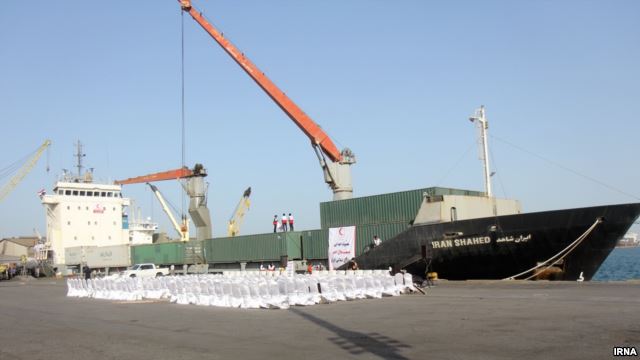An Iranian aid ship docked in Djibouti May 22, averting a showdown with Saudi Arabian and U.S. forces over its original plans to deliver the aid directly to a port in Yemen.
The ship’s arrival was announced by Iran’s semiofficial Fars news agency and Press TV. It was confirmed by officials of the UN World Food Program, who agreed to move the ship’s cargo to war-torn Yemen on Iran’s behalf.
Tehran agreed this week to let the UN inspect the vessel, the Iran Shahed, in a move which also averted a conflict with Saudi-led forces, which have been searching all ships entering Yemeni ports to stop arms from reaching Huthi rebels.
Saudi Arabia and its Sunni Muslim allies have been fighting the rebels, carrying out almost two months of air raids in an effort to reinstall Yemen’s ousted president, who is living in exile in Riyadh.
Shi’ite power Iran backs the Huthis while denying accusations it has been arming them.
But a Financial Times report May 22 raised questions about Iran’s shipping activities. It found that at least four large cargo ships made a “series of highly unusual and undeclared trips between Iran and Yemeni ports controlled by the Huthis in the first few months of the year,” based on a search of maritime records.
While it is not known what cargo the Iranian ships were carrying, they “changed their ensigns, turned off their tracking devices at key points during their voyages, registered false information in international shipping logs, and met unidentified craft mid-ocean,” the newspaper reported.
The mysterious shipping activity occurred just when the Huthi rebellion broke out in Yemen. The rebels since then have dislodged the government and taken over large swaths of the country, including the capital, Sanaa, and biggest port, Aden.
The highly secretive and irregular shipping activity highlights why the United States and Saudi Arabia have been wary of Iran’s intentions, with the United States assigning warships to shadow the latest Iranian cargo ship for days.
The pattern of Iran’s shipments to Yemen has been “neither logical or economic,” Ami Daniel, chief executive of the Windward maritime intelligence service, told the Financial Times. “It indicates that there is a sovereign, not a commercial interest at stake.”







